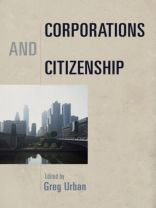President Theodore Roosevelt once proclaimed, ‘Great corporations exist only because they are created and safeguarded by our institutions, and it is therefore our right and duty to see that they work in harmony with those institutions.’ But while corporations are ostensibly regulated by citizens through their governments, the firms in turn regulate many aspects of social and political life for individuals beyond their own employees and the communities that support them. Corporations are endowed with many of the same rights as citizens, such as freedom of speech, but are not themselves typically constituted around ideals of national belonging and democracy. In the wake of the global financial collapse of 2008, the question of what relationship corporations should have to governing institutions has only increased in urgency. As a democratically sanctioned social institution, should a corporation operate primarily toward profit accumulation or should its proper goal be to provision society with needed goods and services?
Corporations and Citizenship addresses the role of modern for-profit corporations as a distinctive kind of social formation within democratic national states. Scholars of legal studies, business ethics, politics, history, and anthropology bring their perspectives to bear on particular case studies, such as Enron and Wall Street, as well as broader issues of belonging, social responsibility, for-profit higher education, and regulation. Together, these essays establish a complex and detailed understanding of the ways corporations contribute positively to human well-being as well as the dangers that they pose.
Contributors: Joel Bakan, Jean Comaroff, John Comaroff, Cynthia Estlund, Louis Galambos, Rosalie Genova, Peter Gourevitch, Karen Ho, Nien-hê Hsieh, Walter Licht, Jonathan R. Macey, Hirokazu Miyazaki, Lynn Sharp Paine, Katharina Pistor, Amy J. Sepinwall, Jeffery Smith, Jeffrey L. Sturchio, Greg Urban.
Tabla de materias
Introduction. Why For-Profit Corporations and Citizenship?
—Greg Urban
PART I. ARE FOR-PROFIT CORPORATIONS IN THE PUBIC INTEREST?
Chapter 2. Corporate Power and the Public Good
—Lynn Sharp Paine
Chapter 3. How Big Business Targets Children
—Joel Bakan
Chapter 4. Corporate Social Purpose and the Task of Management
—Jeffery Smith
Chapter 5. Corporate Purpose and Social Responsibility
—Jeffrey L. Sturchio and Louis Galambos
Chapter 6. Education by Corporation: The Merits and Perils of For-Profit Higher Education for a Democratic Citizenry
—Amy J. Sepinwall
Chapter 7. Enron and the Legacy of Corporate Discourse
—Rosalie Genova
Chapter 8. Saving TEPCO: Debt, Credit, and the ‘End’ of Finance in Post-Fukushima Japan
—Hirokazu Miyazaki
PART II. DOES GOVERNMENT REGULATION OF CORPORATIONS PROMOTE WELL-BEING IN A DEMOCRATIC SOCIETY?
Chapter 9. The Rise and Embedding of the Corporation: Considerations for American Democracy and Citizenship
—Walter Licht
Chapter 10. Citizens of the Corporation? Workplace Democracy in a Post-Union Era
—Cynthia Estlund
Chapter 11. Politics and Corporate Governance: What Explains Policy Outcomes?
—Peter Gourevitch
Chapter 12. The Nature and Futility of ‘Regulation by Assimilation’
—Jonathan R. Macey
Chapter 13. Multinational Corporations as Regulators and Central Planners: Implications for Citizens’ Voice
—Katharina Pistor
Chapter 14. Ethnicity, Inc.: On the Affective Economy of Belonging
—Jean Comaroff and John Comaroff
Chapter 15. Corporate Nostalgia? Managerial Capitalism from a Contemporary Perspective
Karen Ho
Chapter 16. Can For-Profit Corporations Be Good Citizens? Perspectives from Four Business Leaders
—Nien-hê Hsieh
Notes
List of Contributors
Index
Acknowledgments
Sobre el autor
Greg Urban is Arthur Hobson Quinn Professor of Anthropology at the University of Pennsylvania and author of several books, including Metaculture: How Culture Moves Through the World.












